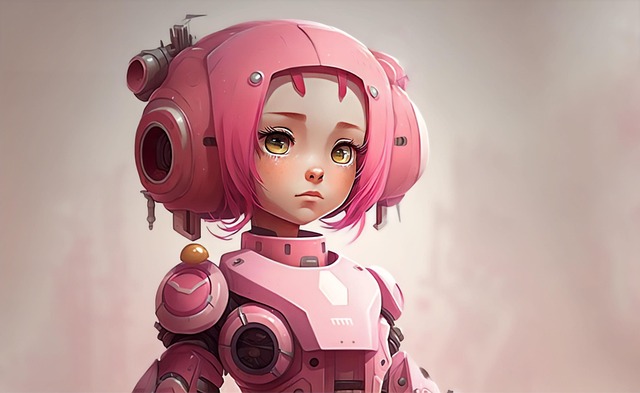Generative chatbot AI powered by NLP and Machine Learning is transforming human-computer interaction with dynamic, intuitive, and contextually aware experiences. These advanced systems, trained on vast datasets, enable complex conversations, 24/7 support, personalized interactions, and tailored recommendations across education, entertainment, healthcare, finance, and retail. While chatbot AI revolutionizes industries, ethical considerations like transparency, fairness, data privacy, and bias are crucial to prevent misuse and ensure responsible development. Regulatory frameworks will play a key role in harnessing chatbot AI's potential while mitigating harm.
“Discover the revolutionary world of Generative AI Chatbots, a game-changing technology transforming interactions and industries. This article provides an in-depth exploration, from the fundamental principles to the vast applications across sectors. We dissect the ‘magic’ behind these chatbots, how they learn and adapt, and their immense potential. Additionally, we delve into ethical considerations and future prospects, offering insights into navigating the challenges of this dynamic landscape, ensuring responsible development and widespread benefits of chatbot AI.”
- Understanding Generative AI Chatbots: Unlocking the Potential
- How Do They Work: The Technology Behind the Magic
- Benefits and Applications: Transforming Industries
- Ethical Considerations and Future Prospects: Navigating the Challenges
Understanding Generative AI Chatbots: Unlocking the Potential

Generative AI chatbots are transforming the way we interact with technology, offering a dynamic and intuitive user experience. Unlike traditional rule-based chatbots, these advanced systems utilize machine learning algorithms to generate human-like responses based on contextual understanding. By training on vast datasets, they learn patterns, nuances, and semantic meanings, enabling them to engage in complex conversations.
The potential of chatbot AI is immense, from enhancing customer service by providing 24/7 support and personalized interactions to revolutionizing content creation by generating text, code, or even art. They can navigate intricate topics, offer tailored recommendations, and adapt to individual user preferences, making them invaluable tools for education, entertainment, and professional settings.
How Do They Work: The Technology Behind the Magic

Chatbot AI, or Generative AI Chatbots, operate through a complex interplay of advanced technologies. At their core, these chatbots leverage Natural Language Processing (NLP) and Machine Learning algorithms to understand and generate human-like text. They are trained on vast datasets, learning patterns and context from millions of conversations, books, articles, and other forms of text data.
Once trained, the chatbot uses this knowledge to process user inputs, breaking them down into components and analyzing them for intent and context. By drawing upon its learned patterns, the chatbot then generates a relevant response, aiming to mimic human conversation while providing valuable information or assistance. This technology continues to evolve, enhancing chatbots’ ability to comprehend nuances and engage in more sophisticated interactions with users.
Benefits and Applications: Transforming Industries

Generative AI chatbots are revolutionizing various industries, offering numerous benefits that enhance efficiency and innovation. These advanced conversational agents can handle complex tasks, from customer service and content creation to data analysis and personalized recommendations. They provide 24/7 availability, instant responses, and scalable solutions, reducing operational costs and improving user experiences.
With their ability to understand natural language and generate human-like text, chatbot AI can transform industries such as healthcare, finance, retail, and education. For instance, in healthcare, they can assist with appointment scheduling, provide medical information, and offer mental health support. In finance, they can automate customer inquiries, analyze investment portfolios, and deliver personalized financial advice. This technology is also transforming the way businesses interact with their customers, fostering better engagement and loyalty.
Ethical Considerations and Future Prospects: Navigating the Challenges

As chatbot AI continues to advance, ethical considerations become increasingly vital. From ensuring transparency and fairness in algorithms to safeguarding user data privacy, developers and users alike must navigate a complex landscape. Bias in training data can lead to harmful outputs, reinforcing societal stereotypes or perpetuating discrimination. Moreover, the potential for misuse, such as generating misleading information or deepfakes, underscores the need for robust safeguards and responsible development practices.
Looking ahead, the future of chatbot AI holds both promise and challenges. Enhancing these tools with contextual understanding and emotional intelligence can foster more meaningful interactions. However, navigating the ethical maze will be crucial to realizing this potential without causing unintended harm. Regulatory frameworks and industry standards are likely to play a significant role in shaping responsible development and deployment, ensuring that chatbot AI serves humanity’s best interests.
Generative AI chatbots are revolutionizing communication and assistance across various sectors. By understanding their technology, we can harness their potential to enhance customer service, streamline workflows, and foster creativity. As we navigate ethical considerations, the future of these chatbots looks promising, offering innovative solutions while ensuring responsible development and deployment of this powerful tool. Embracing chatbot AI means embracing a new era of intelligent, personalized interactions.
